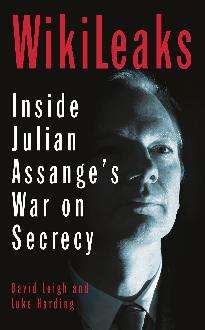WikiLeaks: Inside Julian Assange's War on Secrecy
 | |
| Author |
David Leigh Luke Harding |
|---|---|
| Language | English |
| Subject | WikiLeaks |
| Publisher | Guardian Books |
Publication date | 1 February 2011[1] |
| Media type | Paperback |
| Pages | 352 pages |
| ISBN | 978-0-85265-239-8 |
WikiLeaks: Inside Julian Assange's War on Secrecy is a 2011 book by British journalists David Leigh and Luke Harding. It tells the story of Julian Assange, WikiLeaks, and the leak by Chelsea Manning (then known as Bradley) of classified material to the website in 2010. It was published by Guardian Books in February 2011.[1]
Along with other sources, portions were adapted for the 2013 film The Fifth Estate.
Content
The book describes Assange's childhood and details about his work creating and expanding WikiLeaks. It explains how his surname comes from his stepfather, a "touring puppet theater owner", and not his biological father, a choice that Assange made himself.[2]
Controversies
In response to the book's publication, WikiLeaks posted on Twitter: 'The Guardian book serialization contains malicious libels. We will be taking action.'[3] The Hindu writer, Hasan Suroor, said Assange's concern is that the book is "critical of [Assange's] robust style and his alleged tendency to be a 'control freak'".[4] One of the points of disagreement is that the book claimed he had initially refused to redact the names of Afghan informants to the US military from the Afghan War logs; the book reports him as saying they would "deserve it" if they were killed.[5] When Douglas Murray relayed these comments in a debate on the 9th of April, 2011, Assange interjected "We are in the process of suing The Guardian in relation to that comment."[6] The Guardian claimed the following day that they had 'not received any notification of such action from WikiLeaks or its lawyers', two months after the publication of the book.[7]
In the book, Leigh mentioned the password to a set of unredacted classified US State Department cables. WikiLeaks had earlier distributed multiple copies of files containing all these cables, and others had mirrored their files with BitTorrent. WikiLeaks blamed Leigh and The Guardian for unnecessarily disclosing the password.[8] In response The Guardian said "It's nonsense to suggest the Guardian's WikiLeaks book has compromised security in any way." According to The Guardian, WikiLeaks had indicated that the password was temporary and that WikiLeaks had seven months to take action to protect the files it had subsequently decided to post online.[9] Wikileaks replied that others posted the files online, and as they were publicly available, the password was still useful. The cables contained in the file had their original form and thus they did have all the names that were erased for the safety of the informants. Specifically, the book mentions about the password:
Assange wrote down on a scrap of paper:
ACollectionOfHistorySince_1966_ToThe_PresentDay#. "That's the password," he said. "But you have to add one extra word when you type it in. You have to put in the word 'Diplomatic' before the word 'History'. Can you remember that?"
References
- 1 2 "WikiLeaks". Guardian Books. Retrieved 3 January 2012.
- ↑ "'WIKILEAKS: Inside Julian Assange's War on Secrecy' – the media deal, Assange's real father & Cablegate". International Business Times. 1 February 2011. Archived from the original on 3 January 2012. Retrieved 3 January 2012.
- ↑ WikiLeaks [@wikileaks] (2 February 2011). "The Guardian book serialization contains malicious libels. We will be taking action" (Tweet). Archived from the original on 5 December 2016 – via Twitter.
- ↑ Suroor, Hasan (6 February 2011). "Assange threatens to sue 'Guardian'". The Hindu. Archived from the original on 3 January 2012. Retrieved 3 January 2012.
- ↑ Glover, Stephen (14 February 2011). "Stephen Glover: Assange may yet come to hurt The Guardian". The Independent. Archived from the original on 3 January 2012. Retrieved 3 January 2012.
- ↑ "This house believes whistleblowers make the world a safer place: Part II". New Statesman. 10 April 2011.
- ↑ Addley, Esther (10 April 2011). "Julian Assange claims WikiLeaks is more accountable than governments". The Guardian.
- ↑ Stöcker, Christian (1 September 2011). "Leak at WikiLeaks: A Dispatch Disaster in Six Acts". Der Spiegel. Archived from the original on 3 January 2012. Retrieved 3 January 2012.
- ↑ Ball, James (1 September 2011). "Unredacted US embassy cables available online after WikiLeaks breach". The Guardian. Archived from the original on 3 January 2012. Retrieved 3 January 2012.
- ↑ Love, James (4 September 2011). "In Defense of WikiLeaks: Looking At Cables On Pharmaceutical Drugs And Trade Pressures". The Huffington Post. Archived from the original on 3 January 2012. Retrieved 3 January 2012.
- ↑ Simpson, Connor (31 August 2011). "Wikileaks Is Suing the Guardian Over a Security Breach". The Atlantic Wire. Archived from the original on 3 January 2012. Retrieved 3 January 2012.
External links
- "The story behind Wikileaks: Inside Julian Assange's War on Secrecy". Youtube. 2 February 2011.
- "Guardian Books to publish Wikileaks title next month". Iran Book News Agency. 13 January 2011.
- "Редактор The Guardian опроверг иск Ассанжа к изданию". Lenta.Ru. 8 February 2011.
- "Fundador de WikiLeaks reanuda batalla legal contra su extradición". El Universal. 7 February 2011.
- "Fundador do Wikileaks se disfarçou de mulher para fugir da CIA". AFP. 31 January 2011.
- "Assange svojega očeta dolgo ni poznal: Od njega je podedoval uporniške gene in analitični um". Dnevnik. 1 February 2011.
- "Transparency Terrorist: Review of WikiLeaks: Inside Julian Assange's War on Secrecy". The Oxonian Review. 16 May 2011.